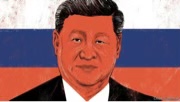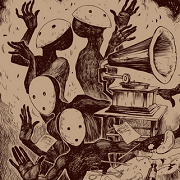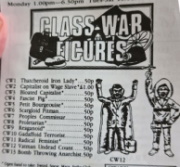(Thread IKs:
dead gay comedy forums)
|
Fish of hemp posted:Well doesn't this prove that people liked Gorbachev's economic planning? It wasn't vote about returning to stalinism. doesn't prove that at all. looks to me like the opposite, in fact - that gorbs industrial liberalization program was unpopular with the people because they saw where that goes. most people didnt give a poo poo about jeans and cola, including gorb himself. the intent wasn't to liberalize end consumer markets. it was to privatize state industries (especially energy) and run them for profit seized by oligarchs and organized crime. disaster pastor posted:i.e. incompetent but not malicious. That seems to be charitable compared to others here. imo there's no difference. i dont care what was in the man's heart, i care about what he did to his own people. whether it was because he was a big scary monster or hes a dumbass or fooled by the west or manipulated by internal factions is irrelevant when being judged by history. he not only allowed but encourage and actively assisted in his country being broke down for parts and given to pigs, ushering in decades of widespread misery among regular people. why would anyone be interested in judging that charitably?
|
|
|
|

|
| # ? May 28, 2024 05:11 |
|
Lol remember when you called those 2 black kids who got murdered at Chaz police plants?
|
|
|
|
AnimeIsTrash posted:Lol remember when you called those 2 black kids who got murdered at Chaz police plants? lol
|
|
|
|
croup coughfield posted:imo there's no difference. i dont care what was in the man's heart, i care about what he did to his own people. whether it was because he was a big scary monster or hes a dumbass or fooled by the west or manipulated by internal factions is irrelevant when being judged by history. he not only allowed but encourage and actively assisted in his country being broke down for parts and given to pigs, ushering in decades of widespread misery among regular people. why would anyone be interested in judging that charitably? I wasn't trying to be charitable, but I can see how caring about why he did the things instead of what those things did could come off that way. Whether he set out to destroy what he inherited or it was a tragic mistake is only of interest academically, I suppose; the historical fact is that it was destroyed and his hands were on the steering wheel.
|
|
|
|
Danann posted:https://invent-the-future.org/2018/01/why-doesnt-the-soviet-union-exist-any-more-part-5-perestroika-and-glasnost/ - good article on how gorby is such a piece of poo poo lol he tried doing Prohibition in loving 1985 thanks for the article, good read
|
|
|
|
mila kunis posted:by not doing what gorbachev did? the soviet economy was in shambles because of him. the ussr had problems in the late 70s, but so did the capitalist world. it was still a better situation than what followed: privatization and price control lifting that led to black markets, goods shortages and the rise of the russian mafia, decaying of infrastructure etc that was directly attributable to gorbachev. I feel its undeniable the union was in a far worse state in 1989 than it was in 1979. is this incorrect? just to beat this drum a bit more. i feel when you consider: - your country suffered a genocidal invasion that you are yet to fully recover from, demographically and economically in the most destructive war in human history - your enemy was spared from the vast majority of the destruction in that war - this enemy already had a huge headstart on you - said enemy is determined to use these advantages throttle your economy, block you off from natural resources across the world, coup countries friendly to you, embargo trade and technology transfers to the maximal extent possible - nuclear weapons exist i'm not sure what the USSR could have done different against the blockade in those circumstances other than going full aggro on world revolution which would've triggered a nuclear holocaust (cf the cuban missile crisis). the only guy to beat the system was my chairman and yours, comrade deng xiaoping, who will go down in history as the man who saved human civilization assuming we ever get out of this current jam.
|
|
|
|
if we say, okay, what Gorbachev did didn't work out, but the "Stalinism" of the post-Khrushchev, run-by-Brezhnev era wasn't all that great either, you'd find yourself in a situation where the country already has industrialized, but now it needs/wants consumer goods and a way to keep growing the economy in a way that doesn't too heavily rely on the top-down management of GOSPLAN and various methods of central planning [I would argue that it could have worked, as scholarship suggests the USSR's production methods weren't that much less efficient than Western firms, but for the sake of argument, let's say it wouldn't have] if you were going to try and forge a "middle-path" that doesn't blow up the economy in about five seconds because suddenly you end production quotas and end state-granted monopolies and you force firms to sink-or-swim in a market economy... ... you might do something like establishing zones wherein foreign investment is allowed, and firms have a freer hand in running their day-to-day operations and determining their production output for profit. You'd keep large parts of the economy still collectivized and state-run, with an eye towards ensuring that all critical goods are still being fulfilled and avoiding inflation. Liberalization would be kept firmly under the whip-hand of the state, able to be withdrawn at a moment's notice. and where does that lead you? back to Deng
|
|
|
|
Would the west be interested in investing in the USSR? The cold war was an ideological struggle and the PRC seized opportunity with both hands.
|
|
|
|
I know breadtube is uncouth but I thought this was a really good video. The creator is going to do a series on the failed German revolution. https://www.youtube.com/watch?v=2B-EWxPyIf4
|
|
|
|
Tankbuster posted:Would the west be interested in investing in the USSR? The cold war was an ideological struggle and the PRC seized opportunity with both hands. I would think so. You drive labor costs down enough, and combine it with a country that already has, and/or is capable of developing, all the energy and logistics demands of expanding capital, and they're not going to be able to help themselves.
|
|
|
|
disaster pastor posted:incompetent but not malicious. croup coughfield posted:imo there's no difference. i dont care what was in the man's heart, i care about what he did to his own people. One saying I've kept using since I initially heard it during the Bush years is "sufficiently advanced stupidity is indistinguishable from malice." Once you pass a certain threshold of harm, motives really cease to matter imo.
|
|
|
|
gradenko_2000 posted:if we say, okay, what Gorbachev did didn't work out, but the "Stalinism" of the post-Khrushchev, run-by-Brezhnev era wasn't all that great either, you'd find yourself in a situation where the country already has industrialized, but now it needs/wants consumer goods and a way to keep growing the economy in a way that doesn't too heavily rely on the top-down management of GOSPLAN and various methods of central planning Yeah like I'm sympathetic to the problems Gorby faced already when he came to power (GOSPLAN was not the most efficient central planning agency, the Soviet Union did have legitimate problems with slow economic growth and lagging productivity, the ongoing debacle in Afghanistan, etc.), and the new ones that piled on top of that shortly thereafter like Chernobyl and the collapse in oil prices leading to the collapse of the USSR's ability to import food and consumer goods. And some of the basic ideas behind his reforms were understandable, like the concept of letting local factories and regions have more control over their production methods and giving workers more say over their factories isn't necessarily bad. But he clearly went way too far, too fast, and combined it with a series of own goals like alcohol prohibition (which, like the collapse of oil prices, led to a huge withdrawal of money from the legal economy, but unlike oil, simply shifted that money into the black market instead while also making the population angry and frustrated). He also bought into the prevalent notion at the time that economic reform (by whatever name you want to call it - decentralization, democratization, liberalization) was impossible without political reform, but he couldn't conceive of a way to do political reform that didn't dismantle the central power of the communist party and state so that's what he did. a more limited and measured method of economic reform that gradually increased the level of local control while still working hard to coordinate local endeavours with central planning and target setting, and a willingness to slow down or reverse reforms if they weren't working in one area (compared to Gorby who seemed to always think that the answer to a reform not working was to do more of it faster, and necessitating the preservation of strong levers of central power that Gorby dismantled as part of his political reforms) would almost certainly have worked better. a more fundamental problem though is that the USSR was just cut off from the world economy in a way that its capitalist rivals weren't, so while the capitalist countries were able to do things like retool their economies around controlling the global flow of finance capital and ship all their jobs to low-wage areas overseas because they didn't care about impoverishing their own working classes, the USSR lacked both the incentive to do that and the means to compete with the flood of cheap offshored goods and financial globalization that took over the world in the 1980s. China was able to harness those changes by becoming an export-oriented part of the world market but it's likely the USSR would never have been allowed to do the same because taking part in that version of the world market meant integrating into the global capitalist system and for ideological and geopolitical reasons the US and its allies would almost certainly never have allowed the Soviets to follow the same path China did
|
|
|
|
i just got to the part in the Shock Doctrine about Gorbachev's final days and the Yeltsin regime. Sickening poo poo, the amount of sheer destruction wrought by the immediate privatization and liberalization by these gangsters seems almost incalculable...
|
|
|
|
https://twitter.com/knafenator/status/1564717121870991360
|
|
|
|
AnimeIsTrash posted:Lol remember when you called those 2 black kids who got murdered at Chaz police plants? lol u got a link handy for that
|
|
|
|
croup coughfield posted:lol u got a link handy for that Opps I was wrong, he didn't call the kids plants but nevertheless it's a gross rear end thing to say. The Voice of Labor posted:you know the rapper dude who was "chaz security" was contracted by the seattle fire chief on behalf of the police chief. those kids were killed by cop contractors which effective makes them killed by cops
|
|
|
|
Fish of hemp posted:Soviet Union in the 1980's was not economic power house. It was very good at producing tanks, guns, spaceships and helicopters, but sometimes people want jeans and soda. And they always need soap.
|
|
|
|
AnimeIsTrash posted:Opps I was wrong, he didn't call the kids plants but nevertheless it's a gross rear end thing to say. lmfao thanks
|
|
|
|
Tankbuster posted:Would the west be interested in investing in the USSR? The cold war was an ideological struggle and the PRC seized opportunity with both hands. I mean west Germany bought gas from the USSR. Doesn't seem impossible though I don't think it would have worked out.
|
|
|
|
i read somewhere that the ussr primarily wanted to trade in-kind. which is to say, trade products for products instead of facilitating everything through money. this is probably due to being cash-poor but i cant confirm that. the us absolutely did not want americans to see soviet-made products in stores and spend money on them. gotta protect the america brand.
|
|
|
|
my dad posted:The Fourth Meeting of the Committee on the Outer Paintjob of The Shithouse That May Not Even Get Built In The First Place may now commence. I mean I like reading this thread, but this made me lol. I won't presume to comment on the honest effort posts in the thread, as my education is ongoing, but thanks everyone for the good stuff. Re: David Harvey: I definitely enjoyed listening to their podcast on some topics, but he feels past his prime and a bit out of touch at times (who could blame him really). Haven't dug into a resvisiting of Capital with him alongside, but I am likely to do so at some point. I do travel alot, any other audio sources the thread would recommend as I leisurely work my way through the history of the immortal science ?
|
|
|
|
Yah if anyone's got good Spotify suggestions I'm all ears
|
|
|
|
Start here https://revolutionaryleftradio.libsyn.com/joseph-mother-loving-stain Or the spotify link https://open.spotify.com/episode/0svcLa0VcgipDtVTIWCKmw?si=K3sFZqSeSzGKkYwDciHXpQ&utm_source=copy-link
|
|
|
|
croup coughfield posted:i read somewhere that the ussr primarily wanted to trade in-kind. which is to say, trade products for products instead of facilitating everything through money. this is probably due to being cash-poor but i cant confirm that. the us absolutely did not want americans to see soviet-made products in stores and spend money on them. gotta protect the america brand. I think this had to do more with the Soviet financial system basically making rubles useless outside of the Soviet Union, forcing trade to be commodities for either commodities, capitalist currency, or gold
|
|
|
|
I'd rather listen to Wagner than expose myself to joseph's motherfucking stain.
|
|
|
|
Raskolnikov38 posted:I think this had to do more with the Soviet financial system basically making rubles useless outside of the Soviet Union, forcing trade to be commodities for either commodities, capitalist currency, or gold Nearly all currencies except for the US dollar are useless outside of the state that issues them, that's how it works. People outside of the state still want them because they buy things from inside that states boundaries. It was ideological boundaries (on both sides) as well as technical issues like connecting the two different financial systems which made trade for commodities awkward.
|
|
|
|
namesake posted:Nearly all currencies except for the US dollar are useless outside of the state that issues them, that's how it works. People outside of the state still want them because they buy things from inside that states boundaries. It was ideological boundaries (on both sides) as well as technical issues like connecting the two different financial systems which made trade for commodities awkward. yeah but you could convert francs to dollars after trading with the French but the ruble wasn’t convertible
|
|
|
|
Raskolnikov38 posted:yeah but you could convert francs to dollars after trading with the French but the ruble wasn’t convertible I'm not quite sure the distinction you're drawing here, rubles could have been traded for other currencies - I don't think exported rubles were somehow exclusively linked to the original seller - but it wasn't a particular priority of traders to trade and speculate in because of ideological adversion and limited commodities offered by the USSR. Currency controls existed throughout the capitalist world right into the neoliberal period and the Chinese reminbi is still not completely convertible internationally so not always being able to completely liquidate your position is not automatically a block to wanting or using a currency.
|
|
|
|
everything i've read about soviet trade mentions the inconvertibility of the ruble as a stumbling block and why the soviets preferred bilateral trades and gold. china has been steadily increasing the convertibility of the reminbi since the early 80s and stopped requiring foreign trade to be done with exchange certificates in '94
|
|
|
|
Yeah that's all true but that's different from suggesting the ruble as a currency was uniquely pointless outside of the USSR because of their financial system.
|
|
|
|
namesake posted:Yeah that's all true but that's different from suggesting the ruble as a currency was uniquely pointless outside of the USSR because of their financial system. Wasn't there some dual currency system the USSR used?
|
|
|
|
AnimeIsTrash posted:Lol remember when you called those 2 black kids who got murdered at Chaz police plants? yeah, I never did that. I said that the chaz security was a police plant, as did the loving seattle abc news.
|
|
|
|
tvol you are the last person who should be bitching about someone being wrong
|
|
|
|
On the topic of absenteeism there was this excerpt I saw going into detail of all the fun different ways to slack of Like leaving to go play soccer that kind of thing. Anyone have anything like that?
|
|
|
|
My new oped for Bloomberg: "The Soviet Origins of Quiet Quitting"
|
|
|
|
croup coughfield posted:tvol you are the last person who should be bitching about someone being wrong what have I ever been wrong about? I mean, like, relevant to the thread
|
|
|
|
  With the timely passing of Gorby a couple days ago, and with the return of school just around the corner, I think this is a good time to get started on my analysis of Capital. This will be the second time in my life I’ve read through (most of) Marx’s Capital, the first time being a couple decades ago between uni and grad school. This analysis will be mostly focused on the first two volumes. It’s worth noting this isn’t a study guide, but more of a distillation/summary of key concepts outlined in Capital. I jump around the text somewhat in an effort to organize my summary, so I don’t necessarily tackle the concepts in order. Some parts will be skipped over for brevity’s sake, and this may lead to regrettable omissions. I wanted to do more than what you’ll end up reading in the posts to come, but school is starting up again so I ran out of time and have to get back to my job – sorry  . . It’s also worth noting that I don’t stick exclusively to Capital; occasionally, I’ll be drawing quotes and concepts from other places where I think they might be helpful or illustrative, based on my pre-existing knowledge, education, or even life experiences. You might see this as a flaw, and that’s fair. I’m just trying to explain these concepts as best I can. Also, I don’t claim to be an expert scholar on Marx. My academic background is in English Lit and to a lesser extent History, to which I more recently added a degree in Education, but through that formal education I only experienced to Marx in a somewhat orthogonal fashion: Marxist analysis is an important framework for literary criticism which seeks to, among other things, view works of literature as facets of superstructure, but engaging on that level doesn’t require reading any Marx directly, and a lot of Marxist concepts will be learned by many Lit grads through osmosis if at all (in fact, you can sadly do a whole English Lit degree at many universities without engaging in any critical theory at all, for reasons that continue to escape and baffle me, though at my uni for my degrees it was required). Likewise, Marxism is important as a framework for analyzing history, but you can also do a History degree without seriously engaging in Marx’s seminal works. Most of my studies of Marxism were done independently and in haphazard fashion, therefore there’s a good chance I may misinterpret some things. I’m also trying to summarize a thousand+-page work into a handful of posts, so there’s a great chance I’m skipping over something that you might think is important. Please, if anyone with a better grasp of any of this thinks I may have gone awry somewhere, or if I’ve made an important omission, or if you think a point I made needs some clarification, etc., do feel free to speak up. I’m doing this at least as much for my own benefit as anyone else’s, so other voices adding to this would be awesome. I’ll be linking further posts to this one, below, for ease of future reference. Part 1: Use-Value and Exchange-Value of Commodities Part 2: The Labour Theory of Value, Commodity Fetishism, and Money Part 3: Capital Accumulation and the Transformation of Money into Capital Part 4: A Brief History of the Rise of Modern Capitalism Part 5: The Nature of Labour and the Source of Surplus Value Part 6: Variable and Constant Capital Part 7: The Organic Composition of Capital, the Profit Cycle, and the Tendency of the Rate of Profit to Fall Part 8: Countertendencies to the Falling Rate of Profit Afterword 
Falstaff has issued a correction as of 12:45 on Sep 9, 2022 |
|
|
|
 Use-Value and Exchange Value of Commodities According to Marx, a Commodity is defined as anything produced for exchange. To be a commodity, it has to be bought and sold; the price tag is the unique insignia of the commodity. Marx posted:A commodity is, in the first place, an object outside us, a thing that by its properties satisfies human wants of some sort or another. The nature of such wants, whether, for instance, they spring from the stomach or from fancy, makes no difference. A commodity leads a double life: it is a product of labour made not just for use, but for exchange. A thing’s use-value satisfies some need or desire for its user. Though use-value is present in nature (everyone needs water to live, it fulfills a need), exchangeability is not a quality found in nature, but only ever in the market (bottle that water and give it a price, and it's a commodity). In other words, the two dimensions of the commodity are what it can be used for, and what it is worth. A fur coat can be used to keep you warm, or it can be used to attract wealth (by being sold as a commodity.) Marx posted:This division of the product into a useful thing and a thing possessing value appears in practice only when exchange has already acquired a sufficient extension and importance to allow useful things to be produced for the purpose of being exchanged, so that their character as values has already to be taken into consideration during production. From this moment on, the labour of the individual producer acquires a twofold social character. Use-value and exchange-value are twin sides of the commodity – opposite poles of its double life. This is not unique to Marx, not by a long shot – Adam Smith also wrote that “A commodity is both a use value and a value.” In fact, even Aristotle had some words to say on the matter... Aristotle posted:Of everything we possess there are two uses. One is the proper use, the second is improper. A sandal, for example, is properly used as footwear. But this same sandal can also be exchanged for food or money. It is true, exchange is also use; but it is not the proper or primary way a sandal should be used. Before capitalism, most production was for use. Most dresses were made to be worn, rather than sold; hammers were made because you needed to build something that required such a tool, not because you wanted to open a hammer store. Aristotle makes clear that this was the case even in antiquity – commerce was a pretty minor part of life which he called Chrematistics. (Confusingly, he called production for use Economics, but we’re allowed to change up the meaning between words over 2200 years – living language!) Likewise, european serfs typically did not produce commodities; they often produced for others, but they usually produced for the use of others, not as something to be sold. So a commodity has a double life. The interesting thing about this double life is that use-value and exchange-value are at odds with one another. This is what Marx called the alienation of use-value. A commodity must be (or at least seem) useful in order to have an exchange value… But it cannot be used until it is sold - its use-value must remain dormant. If a commodity is not exchanged, cannot demonstrate exchangeability, then in a capitalist system its use-value is cancelled. For example: A loaf of bread sitting in a supermarket is useless to everyone. It’s edible, of course, but it must prove its exchange-value before it can be eaten. Absent that, it will be thrown out (and maybe even poisoned), even if people outside the supermarket are starving. No sale, no use; commodities are not made to be given away. You can also see this idea at work in the sabotage of products. A commodity’s quality only matters from the standpoint of sales – if exchange-value is unaffected, capital will happily make a product with less use-value. Phones, appliances, vehicles designed with planned obsolescence in mind; medicines that offer short-term benefits but which can literally kill you over the long-term; products contaminated with chemicals, etc. In fact, for exchange value, flaws often prove beneficial - a company that makes a product that has too much use-value (such as the Budd Company with its extremely durable trains) can end up putting itself out of business. This also plays into overproduction. A capitalist enterprise that overproduces something and puts it into a market that is “glutted” will, inevitably, intentionally destroy many of the commodities it has overproduced, because despite use-value theoretically remaining constant (and it being possible to freely distribute surplus use-value), exchange-value is harmed by overabundance. Prices and profits fall. An example from my life: I used to work selling large appliances in a big box electronics store, and sometimes I’d get to see the company’s inventory sheets. Every year big television manufacturers would produce massive numbers of televisions and ship them out to stores. These items had a shelf-life – after enough time, any of them that had failed to sell (i.e., did not demonstrate exchange value) would be shipped back to central warehouse for destruction. This was true at the manufacturers’ level, as well – any televisions they were unable to sell to stores would, after a time, end up in a landfill. Their use-value was voided, despite being perfectly functional televisions, because they failed to prove their exchange-value, they had to be removed from the market to make room for the next commodity (and to prevent the devaluation of commodities occupying the same market.) So, in summary... Marx posted:A thing can be a use-value, without having value. This is the case whenever its utility to man is not due to labour. Such are air, virgin soil, natural meadows, etc. A thing can be useful, and the product of human labour, without being a commodity. Whoever directly satisfies his wants with the produce of his own labour, creates, indeed, use-values, but not commodities. In order to produce the latter, he must not only produce use-values, but use-values for others, social use-values. Lastly, nothing can have value, without being an object of utility. If a thing is useless, so is the labour contained in it; the labour does not count as labour, and therefore creates no value. This concept of use-value and exchange-value is actually crucial to Marx’s concept of Labour Theory of Value – it helps complete the circle in Aristotle’s thinking about the way the two sides of a commodity interact with each other. 
Falstaff has issued a correction as of 14:25 on Sep 3, 2022 |
|
|
|
reserved
|
|
|
|

|
| # ? May 28, 2024 05:11 |
|
Thanks for doing this! It's always good to get some discussion of the fundamentals itt. This part really stands out to me in particular: Marx posted:A thing can be a use-value, without having value. This is the case whenever its utility to man is not due to labour. Such are air, virgin soil, natural meadows, etc. A thing can be useful, and the product of human labour, without being a commodity. Whoever directly satisfies his wants with the produce of his own labour, creates, indeed, use-values, but not commodities. In order to produce the latter, he must not only produce use-values, but use-values for others, social use-values. Lastly, nothing can have value, without being an object of utility. If a thing is useless, so is the labour contained in it; the labour does not count as labour, and therefore creates no value. because of the modern trend to commodify the environment so that capitalism can assess its value. I feel like periodically I see some article about how some government or other hired an expensive consulting firm to appraise the monetary value of some environmental item: a forest, a river, a national park, etc. It always rubs me the wrong way because these are items that have intrinsic value that is not tied to money, but capitalism can only understand that value by assessing the exchange value of the environment: how much would someone have to pay them for it to be worthwhile to clearcut this forest or pollute this river or drill for oil in the middle of this national park. In that paradigm the use value of a clean environment is meaningless unless the people making decisions about it can be quantified through its exchange value by figuring out the cost-benefit analysis of destroying that environment in the pursuit of profit.
|
|
|



























